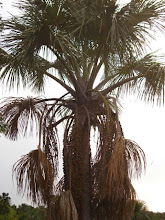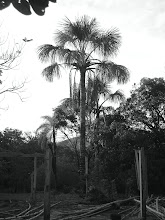Irmãos do mundo! Vamos nos unir!
Indians Fight to Save Brazil's Bananal
In 1960, Brazilian President Juscelino Kubitschek fulfilled his dream of building an ultramodern city from scratch at breakneck speed. "Fifty years in five," was his ambitious campaign slogan, and Brasília was built in just half a decade. But among the many things the planners of Brazil's new capital failed to consider was that the land was already occupied territory. The area's indigenous peoples seemed not to figure into the blueprints of the shiny new city.
Now, Brasília's booming real estate industry and its allies in the local government are scheming to takeover the Bananal, a former ranch-turned-sanctuary for members of the Kariri-Xocó, Guajajara, Tuxá, and Fulni-ô indigenous nations living in the city's periphery. Real estate speculators want to pave over the Bananal and build a luxurious development complex to accommodate some 60,000 of Brasília's richest residents on 20 freshly constructed city blocks. Each home is expected to cost around 1.5 million dollars.
Financial speculation in the Brazilian stock market has created a newly wealthy class eager for new high-end digs. The city's designers predicted the Brasília would have 500,000 residents by the year 2000; today, 2.5 million people call the city home. The potential real estate development would continue Brasília's sprawling push into the surrounding cerrado, a fragile high-plains ecosystem that The Nature Conservancy calls "the world's most biologically rich savannah." http://www.nature.org/wherewework/southamerica/brazil/work/art5082.html
With some 220 multi-million-dollar homes in the balance, the Bananal is a potential gold mine in the eyes of developers and the local government. But for the Indians who live in the Bananal, and for the eco-activists who have assumed the fight as their own, there is nothing potential about the wealth of the land. For the indigenous locals, the Bananal's trees, rivers, and crops represent all the development they need. All they want is a land title granting them formal ownership of a swath of old ranchland they have inhabited for the last four decades.
Although the Bananal only has some 30 year-round residents, indigenous groups consider the place a spiritual sanctuary. For six months out of the year, more than 100 Indian pilgrims travel to the cerrado for religious ceremonies in the Bananal's so-called Sacred Sanctuary of the Shamans, according to SantuariodosPajes.org, a website dedicated to preserving the Bananal. The community cultivates subsistence crops, practices craftwork, and maintains spiritual and medicinal traditions passed on by elders.
"The Bananal resistance is very symbolic," says Rafael Moreira of the Cultural Association of Indigenous People, a Brasília-based group marching arm in arm with the indigenous in their struggle for demarcation and autonomy. "It represents a safe place to different Indians who come to the capital in order to fight for their rights, to rest a little, to manifest their religions, their languages… and to organize politically. That's what the government doesn't want, organized Indians so close by."
Moreira sees the push to develop the Bananal as a continuation of more than five centuries of displacement and extermination forced on America's indigenous cultures. In place of Iberian conquistadors, indigenous peoples now face an alphabet soup of powerful corporations and government agencies—TERRACAP, ADEMI, GDF, IBAMA. If these groups get their way, the Northwest Sector Project, as the real estate development is called, will go from the design phase to implementation.
One of the people behind the project is Paulo Octávio, a real estate mogul and Vice-Governor of the Brasília Federal District. In addition to an ascendant political career, Octávio is also the head of the multi-billion dollar PaulOOctavio Investment Group, one of the Northwest Sector's loudest proponents. Octavio's company recently named a São Paulo housing development "Residencial Alírio Neto," in deference to the president of Brasília's legislative chamber, a figure key to the success of the Northwest Sector.
In addition to the land speculators, the people of the Bananal are also up against a hostile government. Moreira accuses the government's indigenous affairs agency (FUNAI) of sitting on its hands. "The President of FUNAI, Márcio Meira, recently went to the Bananal, promising that the Indians would not be forced by police to leave their homes, and that FUNAI would struggle with them for their rights," says Moreira. "But nothing has been done."
On October 22, despite Meira's promise, some 20 representatives of Brasília's state-owned real estate company, TERRACAP, flanked by military police, stormed into the Bananal, destroying crops and the hut of a local family. And the local media has compliantly ridiculed the Bananal struggle and demonized them as "invaders."
According to a statement published by SantuariodosPajes.org, "The Governor of Brasília himself called the Indians 'a joke' and 'freaks', when affirming that he was unaware of the indigenous presence in the cerrado of Brasília."
Those defending the Bananal claim to have the law on their side. For one, the Brazilian Constitution clearly states, "Indians shall have their social organization, customs, languages, creeds, and traditions recognized, as well as their native rights to the lands they traditionally occupy, it being incumbent upon the Republic to demarcate them and protect and ensure respect for all their property."
"The Bananal lands," says Moreira, "are only twenty minutes from FUNAI, ten from the Congress, and five from the University of Brasília. How can the politicians speak in favor of the Indians and for the protection of the environment if they don't do these things in their own backyard?"
Brazil is also a signatory to the UN Declaration on the Rights of Indigenous People, which the government ratified in September 2007. Moreira claims that part of the government's intransigence on the Bananal dispute stems from its worry that a victory there could pave the way for other indigenous groups with similar claims.
Environmentalists note that Brazil's ascent as regional superpower is rooted in the despoiling of the Amazon, but the lesser-known cerrado, another of South America's most important bioregions, has been subjected to similar degradation, with an estimated 80 percent already destroyed, according to Conservation International. http://www.biodiversityhotspots.org/xp/hotspots/cerrado/
The cerrado covers 21 percent of Brazil's massive national territory and it includes the headwaters of three of South America's largest river systems—the Amazon, São Francisco, and Paraná rivers. Moreira says, "The Águas Emendadas spring, located in Brasília DF, is the cradle of water that runs from the north to the south of the country."
"Only if they kill us all they will they be able to implement this horrible 'ecological' landscape," Moreira finished, alluding to the "green" vision developers are gloating about. "The Northwest Sector Project happens in all countries. It's all the same thing: destruction and human greed. International help is necessary."
By Simón Farabundo Ríos










































































Nenhum comentário:
Postar um comentário